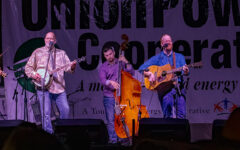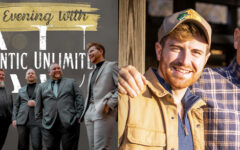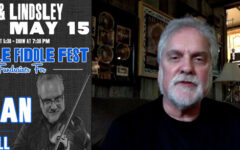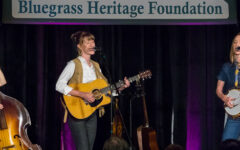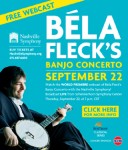 Saturday, September 24 was a grand evening at the Nashville Symphony. Béla Fleck’s Concerto for Banjo was the obvious centerpiece of the night, but the piece was bookended by two symphonic pieces, the first being Aaron Copland’s Appalachian Spring (with a transcendently serene outro).
Saturday, September 24 was a grand evening at the Nashville Symphony. Béla Fleck’s Concerto for Banjo was the obvious centerpiece of the night, but the piece was bookended by two symphonic pieces, the first being Aaron Copland’s Appalachian Spring (with a transcendently serene outro).
Next came Béla, and the excitement as he walked out was substantial, though maybe a bit less so than opening night. I streamed some of the premiere on Thursday and the energy was palpable even through an Internet video stream, yet seeing it live was glorious.
The Concerto gives Béla a chance to show the full range of what the banjo can do. There were sections of blistering runs of triplets, contemplative moments of beauty, and undeniable displays of virtuosic technique. Béla would also provide a rhythmic and harmonic bed for the other orchestral instruments to be featured. The true highlight was the cadenza in the final movement that featured some of the most extraordinary banjo playing I have ever heard.
At times it was a bit challenging to hear the banjo, and if there was any amplification it was difficult to tell. That being said, I could hear most of what he played, and it helped the banjo sink into the orchestra giving an interesting and important effect.
There was applause after every movement. Usually this a no-no in classical music, but maybe this was not “classical” music. The music covered a large gamut of styles, and offered an intriguing glimpse into Béla’s path as a musician. It had moments of swing, Gershwin, contemporary classical, and more. If anything predominated, many moments of orchestration sounded like a symphony playing Flecktones-style music. Being a longtime listener and fan of that band, this is not a bad thing; it makes the piece so vibrant, singular, and unique. There was even a touch of a bluegrass feel in the key of G in the final movement (though it was fleeting). Most transitions between parts were skillfully handled, both compositionally and in performance.
I can imagine some challenges in rehearsals over the time-feel. Time-feel for an orchestra can be so different than a smaller ensemble. The conductor obviously keeps the time, but with downbeats moving across a body of 60 musicians, it can become something entirely different. In talking to people who attended both rehearsals and saw some of the other performances, it took a while for the orchestra to find the “pocket.” Yet to my ears on Saturday night, they had found it. The blazing passages played by the orchestra were mostly spot on, and the groove was confident, and at times even danceable.
Afterwards Béla played an encore of Happy Birthday segued into and extended version The Ballad of Jed Clampett from the Beverly Hillbillies, deftly taking the diminished harmony of the piece and developing it extensively with both humor and virtuosity. It was a fitting, honorable, and apropos nod to Earl Scruggs, to whom the Concerto is dedicated.
Conductor Giancarlo Guerrero is phenomenal and this orchestra is quite impressive. The final piece of the evening was Tchaikovsky’s larger-than-life Fourth Symphony, which was the most spectacularly moving symphony I have ever seen live. I almost expected fireworks at the end. It is considered one of Tchaikovsky’s most grand symphonies, and if anything, this piece dwarfed the Concerto for Banjo. Maybe a different program would let the Béla’s composition stand as the highlight of the evening.
There are no immediate plans for CD release of the Concerto for Banjo. All three nights were recorded, though with the composition being only 33 minutes, more music would be needed for a CD release.
In the meantime, there is talk that other symphonies will be bringing this piece to a city near you (hopefully). If so, this is one of those special events not to be missed. It is a significant step forward for the banjo, and always an honor to be in the presence of such a wonderful musician and composer of our time.

